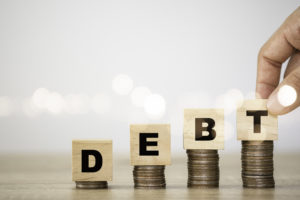
Sort out your debts with a short term loan from LoanPig.
Household debt in the UK is worse than at any time on record. According to The Office for National Statistics, British households spent around £900 more on average than they received in income last year. The overall shortfall amounted to nearly £25 billion, and most people are paying for this overspend with borrowed money, though some households are also taking money from savings.
So if you are struggling with debt you can take some comfort from the fact that you are not alone. But it is also time to take action before your situation gets worse.
But let’s first take a look at what debt actually is.
There are two main types of debt: secured and unsecured. Secured debts are usually tied to an asset. For example a mortgage is a loan that is secured on a property, which means that the lender can repossess that property if the borrower falls behind on their repayments.
Unsecured debt is not tied to any asset. An example is a credit card. Interest rates tend to be much higher on unsecured debts because the lender has no asset to repossess in the event of repayments not being made. The lender would, however, impose additional charges if repayments are not made – and may resort to court action if the situation continues.
There is a general understanding that you can have good debt and bad debt. In one sense, all debt is bad. But a mortgage is generally classed as good debt because you are using it to acquire an asset; so in that sense it is an investment. Whereas uncontrolled and unsecured debts such as credit cards are seen as bad because they can spiral out of control very quickly and lead to the situation where you are unable to pay them back.
So let’s look at some guidelines for good and bad debt, and some practical ways to deal with bad debt.
You could regard debt as being good if:
- It is a carefully considered decision with a specific aim rather than impulse overspending
- It will help you to improve your circumstances longer term; for example to buy a home or car, or fund an educational or business opportunity
- You have researched options and are confident that you are getting a good deal
- You are confident that you will be able to repay the loan
- Your credit score is stable enough to withstand the process of applying for a loan.
But before taking on any kind of debt it is really important to commit to keeping up with the repayments. If possible try and repay the debt earlier than planned, as you will then save money on the interest you would otherwise have been charged.
If by reading this article you realise that you are in bad debt – the sort that keeps you awake at night – then you need to take action.
If you have a lot of repayments every month at high rates of interest and they are overwhelming you, one solution could be to take another loan at a better rate of interest and over a longer repayment period. You could pay off all your existing debts and end up with just one affordable monthly repayment which may help to get things back on track again.
There are some loan companies – such as LoanPig – who will consider lending to you even if you have a poor credit rating. We take every application on its merit rather than just on credit scores. Whilst no responsible lender will encourage you to take on more debt than you can afford to repay, sometimes the best thing can be to wipe the slate clean of your existing debts and concentrate on paying off just one new loan.
If you do this then it is essential not to slide any further into debt. Aim to borrow as little as you can and repay it as regularly and as quickly as possible.
If you would like to find out more about how LoanPig could help you to sort out your finances then why not get in touch with us today? We offer a range of short term loans that may be just what you need to help you through. You can contact us online or email us at info@loanpig.co.uk.
